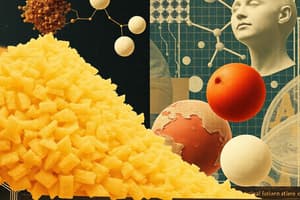Podcast
Questions and Answers
Which of the following is a major class of biomolecules?
Which of the following is a major class of biomolecules?
- Minerals
- Carbohydrates (correct)
- Fats
- Vitamins
What is the branch of science that explores the chemical processes within and related to living organisms?
What is the branch of science that explores the chemical processes within and related to living organisms?
- Biotechnology
- Biomathematics
- Biophysics
- Biochemistry (correct)
What are carbohydrates derivatives of?
What are carbohydrates derivatives of?
- Fatty acids
- Amino acids
- Nucleotides
- Polyhydric alcohols (correct)
In what ratio are the elements present in carbohydrates?
In what ratio are the elements present in carbohydrates?
What components does biochemistry focus on at a molecular level?
What components does biochemistry focus on at a molecular level?
What is the focus of biochemistry?
What is the focus of biochemistry?
Which elements are present in carbohydrates in the same ratio as water?
Which elements are present in carbohydrates in the same ratio as water?
What are the four major classes of biomolecules?
What are the four major classes of biomolecules?
What do carbohydrates consist of?
What do carbohydrates consist of?
What does biochemistry bring together?
What does biochemistry bring together?
Flashcards are hidden until you start studying
Study Notes
Introduction to Biochemistry and Carbohydrates
- Biochemistry is the study of chemical processes within living organisms, combining biology and chemistry in a laboratory-based science.
- It focuses on molecular-level processes within cells, including the study of proteins, lipids, and organelles, as well as cellular communication during growth and illness.
- The four major classes of biomolecules are Carbohydrates, Proteins, Nucleic acids, and Lipids.
- Carbohydrates are organic compounds containing carbon, hydrogen, and oxygen in the same ratio as water (2:1), and they can be aldehyde or ketone derivatives of polyhydric alcohols.
- They play a crucial role in energy storage and provide structural support in living organisms.
- Carbohydrates are essential for cellular communication and play a key role in processes such as growth and fighting illness.
- They are present in various forms in nature, including sugars, starches, and fibers, and are a fundamental component of the human diet.
- Carbohydrates are involved in various biological processes, including energy production, cell signaling, and immune response.
- Their structure and function are closely linked to their role in providing energy for the body and serving as a structural component in cells.
- Understanding the chemistry of carbohydrates is essential for comprehending their biological roles and potential applications in medicine and nutrition.
- The study of carbohydrates in biochemistry encompasses their chemical structure, properties, and interactions within living organisms.
- Carbohydrates are a key focus in medical biochemistry and molecular biology due to their significance in cellular processes and their impact on human health.
Studying That Suits You
Use AI to generate personalized quizzes and flashcards to suit your learning preferences.



